(VOVWORLD) - Eleven countries, including Japan, Canada, and Vietnam, signed a landmark Asia-Pacific trade agreement without the United States on Thursday in what Chilean foreign minister Heraldo Munoz called a powerful signal against protectionism.

The Comprehensive and Progressive Agreement for Trans-Pacific Partnership (CP TPP) was officially inked in Chile on March 8, 2018 (Photo: VNA)
|
The ambitious deal came after the US pulled out the Trans-Pacific Partnership (TPP) agreement last year. The provisions of the Comprehensive and Progressive Agreement for Trans-Pacific Partnership (CPTPP) were basically unchanged from the original TPP, except for the suspended implementation of 22 provisions mainly related to intellectual property.
The official signing of the pact will facilitate the promotion of economic growth and job generation, poverty reduction, and improvement of people’s living conditions. With its commitment to open markets, CPTPP delivers a strong message against protectionism, while arguing that an open economy will benefit member nations.
Speaking on the sidelines of the signing ceremony that took place in Santiago, Chile, Vietnamese Minister of Industry and Trade Tran Tuan Anh said Vietnam’s participation in the trade pact reflects a new level of regional and global integration: “Despite the dominance of trade liberalization and facilitation, protectionism and populism have increasingly bucked this trend. CPTPP membership shows Vietnam’s determination to resolutely implement its policies to undertake proactive, intensive and extensive international integration”.
Minister Anh said the government will issue an action plan to specify tasks, in particular, reviewing and adjusting legal frameworks to match its commitments to the pact.
A World Bank report released on Friday said CPTPP will bring direct economic benefits to Vietnam. The CPTPP, along with other multilateral trade agreements, is expected to further boost investment in Vietnam and its export-driven growth model, according to the report. The study estimated that even under conservative assumptions, the trade deal will lead to an increase in Vietnam’s GDP of 1.1 % by 2030.
Sebastian Eckardt, the World Bank’s chief economist for Vietnam, said the CPTTP will provide an impetus for domestic reforms in many areas, such as intellectual property, labor standards, and rules of origin. He added that honoring CPTPP commitments will promote transparency and support the creation of modern institutions in Vietnam.